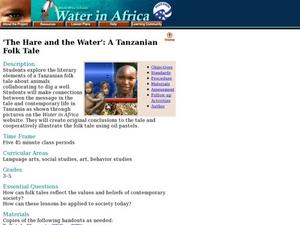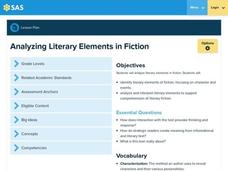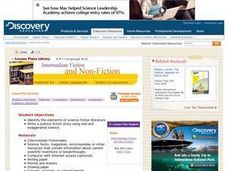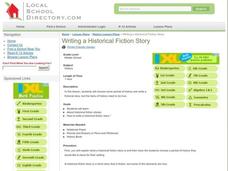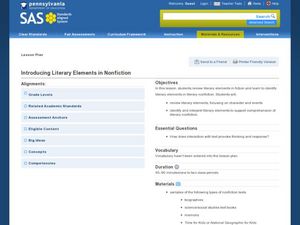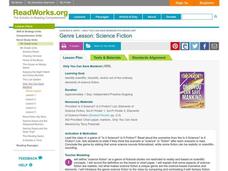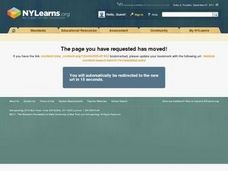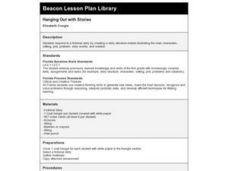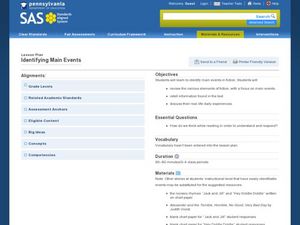Curated OER
Fiction Elements in Hatchet
Students read or listen to Hatchet by Gary Paulsen, identify elements of fiction, develop writing, thinking, and organizing skills, and create PowerPoint slides based on the story.
Curriculum Corner
Fiction Organizer
Teach your youngsters about the elements of plot with this handy graphic organizer. Pupils note down the main character, the setting, the problem, and the solution of any fictional story they read.
Curated OER
The Hare and the Water: A Tanzanian Folk Tale
"The Hare and the Water," a Tanzanian folk tale, lends a global perspective to literary analysis. Learners spend the first two days reading and storyboarding. On day three, they examine folk tale elements (worksheet included), and design...
Curated OER
Civil War Literature Circle
Historical fiction can be a valuable asset when learning about the past. Integrate several novels written about the Civil War into your social studies unit, with groups of four working collaboratively to comprehend the novel from...
Pennsylvania Department of Education
Analyzing Literary Elements in Fiction
Students analyze the characters and events in fictional writing. In this literary elements instructional activity, students study the meaning of the words characterization and fiction. They listen to the story Pigsty by Mark Teague, or...
Curated OER
Science Fiction Literature
Students identify the elements of science fiction literature. They write and illustrate a science fiction story using real and exaggerated science. In addition, they read their stories aloud in small groups.
Curated OER
The Power of Fiction
Students explore fiction that moves individuals to social action. For this literature lesson, students read The Jungle by Upton Sinclair and analyze its literary worth as well as its investigative journalism. Students investigate other...
Curated OER
Rudyard Kipling's "Rikki-Tikki-Tavi": Mixing Fact and Fiction
"Rikki-Tikki-Tavi," from The Jungle Book, offers young readers a chance to examine how Rudyard Kipling uses setting and personification to bring to life the brave mongoose who battles cobras to protect his family. Class members explore...
Curated OER
Comparing Fiction and Nonfiction
Fifth graders compare and contrast an informational article with a fictional story. They read the story "The Contest" as a class, and discuss the different types of literature genres. Next, they complete a vocabulary worksheet and a...
Curated OER
Writing a Historical Fiction Story
What is historical fiction? After explaining the difference to your learners, it's time to give each learner a try! With your support, encourage them to research, plan, and write their own historical fiction story. Don't forget to have a...
Curated OER
Introducing Literary Elements in Fiction
Identify literary elements in fiction. In this reading comprehension lesson, learners read the book Pigsty and record literary elements onto a graphic organizer. They specifically discuss the main characters and events in the text.
Curated OER
Introducing Literacy Elements in Nonfiction
Explore nonfiction writing with your class. They will identify elements in nonfiction by reviewing elements of fiction. Then they use biographies, memoirs, menus, Time for Kids, and text books to identify elements of nonfiction. They...
Curated OER
Analyzing Nonfiction Text Elements - Editorials
Examine the text features of non-fiction. Start the lesson by reading editorial samples provided by their instructor and analyze the texts for word choice, details, and organization. An editorial example and graphic organizer are...
Curated OER
Five Elements of a Story
Here’s a graphic organizer that permits learners to chart the introduction, rising action, climax, falling action and resolution of a story. The PDF file can be customized to work with any narrataive.
Curated OER
A "How To" Project in the Science Fiction Genre
You can have students use science fiction elements to create a "How To" brochure that can stir the imagination.
Curated OER
Science Fiction
Do your sixth graders like science fiction? Learn to identify elements of the science fiction genre with a literature lesson. They read from Only You Can Save Mankind and identify the objects, words, and characters from the scenarios....
University of North Carolina
Literature (Fiction)
An informative installment of the Writing for Specific Fields series helps readers learn how to interpret and write about fiction. The website details nine easy steps for writing a literary analysis—a useful method for all readers!
Curated OER
Fiction Book Report
Fourth graders review a fictional book in which they give an overview of the characters and storyline. Microsoft Word is used to type a final draft of their review and to create a cover page with a picture.
Curated OER
Hanging Out with Stories
Help your class listen and respond to a fictional story by creating a story structure mobile illustrating the main characters, setting, plot, problem, story events, and solution. Using a coat hanger, they will create an artistic element...
Curated OER
Identifying Main Events
Help kindergartners learn to identify the main events in fiction. They will review elements of fiction, retell information found in the text, and discuss their real-life daily experiences. All the while, they will be asking themselves...
Curated OER
Wagons West!
The first pioneers faced many obstacles on their journey west. Middle schoolers read different historical fiction texts (ideas are provided), make connections, and complete a detailed packet (included). Reading guides, journal ideas, and...
Great Schools
Different Types of Writing
What type of writing is this? Learners read a brief introduction to various types of text: instructions, explanations, poems, folk tales, novels, informative, and arguments. The introduction doesn't explain these, so consider going over...
Curated OER
Different Strokes For Different Folktales
Young readers use graphic organizers, such as Venn diagrams and story maps, to analyze a variety of folktales and the elements of a story. They use writing, sequencing activities, and creative art to identify the morals learned from a...
Curated OER
Analyzing the Use of Irony in a Short Story
Ninth graders examine how literature connects to real-life and see how irony aids in the development of theme. They read Shirley Jackson's The Lottery, and discuss elements of foreshadowing and situational irony. Then learners will write...
Other popular searches
- Elements of Fiction
- Literary Elements of Fiction
- Elements of Non Fiction
- Elements of Fiction Books
- 8 Elements of Fiction
- Teaching Elements of Fiction
- The Elements of Fiction
- Elements of Fiction Conflict
- Elements of Fiction Hatchet
- Humor Elements of Fiction
- Realistic Fiction Elements
- Elements of Mystery Fiction




